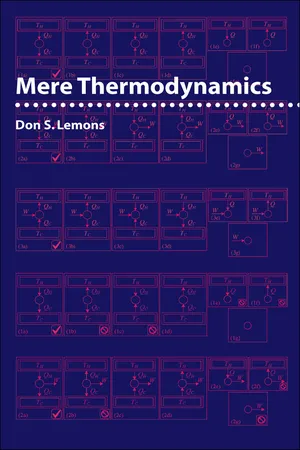
- English
- ePUB (mobile friendly)
- Available on iOS & Android
Mere Thermodynamics
About this book
Presenting classical thermodynamics as a concise and discrete whole, Mere Thermodynamics is a perfect tool for teaching a notoriously difficult subject.
Accomplished teacher Don S. Lemons introduces the physical theory's concepts and methods and uses them to solve problems from a broad range of physics. He illustrates, at a gentle pace, not only the fundamentals of the subject but also advanced topics such as the relationship between the second law of thermodynamics and entropy. He highlights the intellectual structure and history of the discipline and explores the logical consequences of each of the famous three laws. Lemons explains and develops the first two laws and their corollaries, the methods and applications of thermodynamics, and the third law, as well as non-fluid variables, equilibrium and stability, and two-phase systems.
The book features end-of-chapter practice problems, an appendix of worked problems, a glossary of terms, and an annotated bibliography.
Tools to learn more effectively

Saving Books

Keyword Search

Annotating Text

Listen to it instead
Information
Table of contents
- Cover
- Title Page
- Copyright Page
- Contents
- Preface
- 1. Definitions
- 2. Equilibrium
- 3. Heat
- 4. The First Law
- 5. The Second Law
- 6. The First and Second Laws
- 7. Entropy
- 8. Fluid Variables
- 9. Simple Fluid Systems
- 10. Nonfluid Systems
- 11. Equilibrium and Stability
- 12. Two-Phase Systems
- 13. The Third Law
- Appendixes
- Annotated Bibliography
- Index
Frequently asked questions
- Essential is ideal for learners and professionals who enjoy exploring a wide range of subjects. Access the Essential Library with 800,000+ trusted titles and best-sellers across business, personal growth, and the humanities. Includes unlimited reading time and Standard Read Aloud voice.
- Complete: Perfect for advanced learners and researchers needing full, unrestricted access. Unlock 1.4M+ books across hundreds of subjects, including academic and specialized titles. The Complete Plan also includes advanced features like Premium Read Aloud and Research Assistant.
Please note we cannot support devices running on iOS 13 and Android 7 or earlier. Learn more about using the app